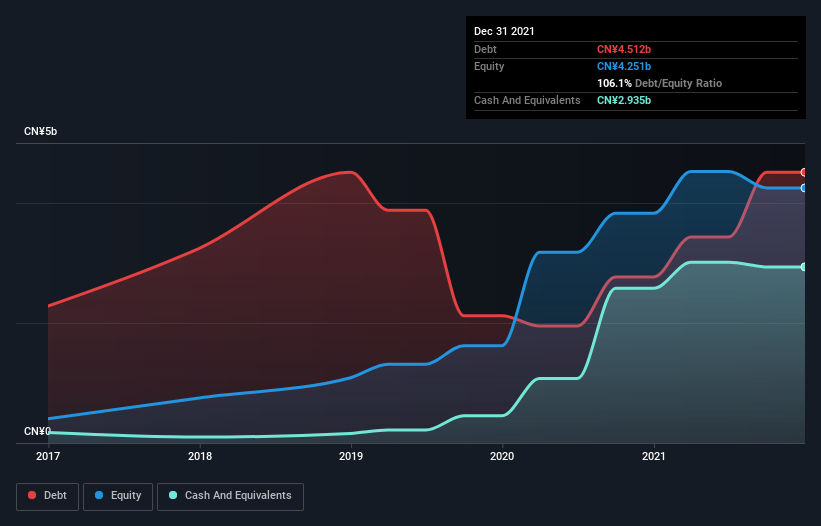- Hong Kong
- /
- Real Estate
- /
- SEHK:9968
These 4 Measures Indicate That Huijing Holdings (HKG:9968) Is Using Debt Extensively
Warren Buffett famously said, 'Volatility is far from synonymous with risk.' So it might be obvious that you need to consider debt, when you think about how risky any given stock is, because too much debt can sink a company. We can see that Huijing Holdings Company Limited (HKG:9968) does use debt in its business. But should shareholders be worried about its use of debt?
Why Does Debt Bring Risk?
Generally speaking, debt only becomes a real problem when a company can't easily pay it off, either by raising capital or with its own cash flow. Part and parcel of capitalism is the process of 'creative destruction' where failed businesses are mercilessly liquidated by their bankers. However, a more frequent (but still costly) occurrence is where a company must issue shares at bargain-basement prices, permanently diluting shareholders, just to shore up its balance sheet. Of course, plenty of companies use debt to fund growth, without any negative consequences. When we examine debt levels, we first consider both cash and debt levels, together.
View our latest analysis for Huijing Holdings
How Much Debt Does Huijing Holdings Carry?
As you can see below, at the end of December 2021, Huijing Holdings had CN¥4.51b of debt, up from CN¥2.77b a year ago. Click the image for more detail. On the flip side, it has CN¥2.94b in cash leading to net debt of about CN¥1.58b.

How Healthy Is Huijing Holdings' Balance Sheet?
Zooming in on the latest balance sheet data, we can see that Huijing Holdings had liabilities of CN¥8.62b due within 12 months and liabilities of CN¥2.31b due beyond that. Offsetting this, it had CN¥2.94b in cash and CN¥702.4m in receivables that were due within 12 months. So its liabilities total CN¥7.29b more than the combination of its cash and short-term receivables.
This deficit is considerable relative to its market capitalization of CN¥7.91b, so it does suggest shareholders should keep an eye on Huijing Holdings' use of debt. Should its lenders demand that it shore up the balance sheet, shareholders would likely face severe dilution.
We measure a company's debt load relative to its earnings power by looking at its net debt divided by its earnings before interest, tax, depreciation, and amortization (EBITDA) and by calculating how easily its earnings before interest and tax (EBIT) cover its interest expense (interest cover). Thus we consider debt relative to earnings both with and without depreciation and amortization expenses.
With a debt to EBITDA ratio of 1.5, Huijing Holdings uses debt artfully but responsibly. And the alluring interest cover (EBIT of 8.8 times interest expense) certainly does not do anything to dispel this impression. But the other side of the story is that Huijing Holdings saw its EBIT decline by 5.4% over the last year. That sort of decline, if sustained, will obviously make debt harder to handle. The balance sheet is clearly the area to focus on when you are analysing debt. But you can't view debt in total isolation; since Huijing Holdings will need earnings to service that debt. So if you're keen to discover more about its earnings, it might be worth checking out this graph of its long term earnings trend.
Finally, a company can only pay off debt with cold hard cash, not accounting profits. So it's worth checking how much of that EBIT is backed by free cash flow. Over the last three years, Huijing Holdings saw substantial negative free cash flow, in total. While that may be a result of expenditure for growth, it does make the debt far more risky.
Our View
We'd go so far as to say Huijing Holdings's conversion of EBIT to free cash flow was disappointing. But on the bright side, its interest cover is a good sign, and makes us more optimistic. Overall, we think it's fair to say that Huijing Holdings has enough debt that there are some real risks around the balance sheet. If everything goes well that may pay off but the downside of this debt is a greater risk of permanent losses. There's no doubt that we learn most about debt from the balance sheet. But ultimately, every company can contain risks that exist outside of the balance sheet. Case in point: We've spotted 2 warning signs for Huijing Holdings you should be aware of, and 1 of them doesn't sit too well with us.
If you're interested in investing in businesses that can grow profits without the burden of debt, then check out this free list of growing businesses that have net cash on the balance sheet.
Valuation is complex, but we're here to simplify it.
Discover if Huijing Holdings might be undervalued or overvalued with our detailed analysis, featuring fair value estimates, potential risks, dividends, insider trades, and its financial condition.
Access Free AnalysisHave feedback on this article? Concerned about the content? Get in touch with us directly. Alternatively, email editorial-team (at) simplywallst.com.
This article by Simply Wall St is general in nature. We provide commentary based on historical data and analyst forecasts only using an unbiased methodology and our articles are not intended to be financial advice. It does not constitute a recommendation to buy or sell any stock, and does not take account of your objectives, or your financial situation. We aim to bring you long-term focused analysis driven by fundamental data. Note that our analysis may not factor in the latest price-sensitive company announcements or qualitative material. Simply Wall St has no position in any stocks mentioned.
About SEHK:9968
Huijing Holdings
An investment holding company, engages in the property development and investment activities in the People’s Republic of China.
Moderate risk and slightly overvalued.
Similar Companies
Market Insights
Community Narratives



